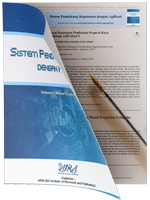Integration of Artificial Intelligence in Islamic Education Management System to Improve Administrative Efficiency
DOI:
https://doi.org/10.55537/spk.v4i2.1305Keywords:
Artificial Intelligence, Islamic Education Management, Information Systems, Administration, AutomationAbstract
Islamic educational institutions such as madrasas often experience delays and data errors in grade processing and report preparation because administrative processes are still carried out manually. This study aims to automate grade recaps and academic report generation by applying artificial intelligence (AI) to improve the efficiency and accuracy of educational management. The methods used include needs analysis in one Islamic high school (MA), AI-based system design, and implementation of a machine learning module for grade analysis. This trial was conducted in one Madrasah Aliyah (MA) with 150 student grade records collected between July and December 2024 and 20 teaching and education staff. The test results showed that the average grade recap time was reduced from approximately 2–3 days to only 8–10 minutes (≈97%), academic report generation from 3–5 days to 1–2 hours, and the input error rate decreased by more than 90%. A total of 85% of teaching and administrative staff stated that the system was very helpful in their work. These findings confirm that AI integration significantly improves the efficiency, accuracy, and transparency of Islamic educational administration while making an important contribution to the madrasah digitalization agenda. This research is expected to make a tangible contribution to the digitalization of Islamic education through the use of AI technology. Although the prototype was demonstrated at a single institution, its modular architecture illustrates a novel adaptation of AI in Islamic educational administration.
Downloads
References
U.S. Department of Education, Office of Educational Technology, Artificial Intelligence and the Future of Teaching and Learning: Insights and Recommendations. Washington, DC, USA: U.S. Department of Education, May 2023.
V. J. Owan, A. O. Obia, M. J. Duruamaku-Dim, F. E. Obeten, and O. J. Ebuara, "Artificial Intelligence in Higher Education Institutions: Review of Innovations, Opportunities and Challenges," Frontiers in Education, 2025. http://doi.org/10.3389/feduc.2025.1530247
Gohain, D., “Digitalization of Higher Education: Opportunities and Threats,” dalam Digitalization of Higher Education: Opportunities and Threats, T. Chakraborty, A. Natarajan, M. Mishra, & M. Ganguly, Eds. First edition, Apple Academic Press / CRC Press, 2024, pp. 157-180.
J. W. Richardson, M.-H. Huang, and R. Rust, "Transforming School Leadership With Artificial Intelligence," Leadership and Policy in Schools, 2024. http://doi.org/10.1080/15700763.2024.2411295
Patel, J.; Gandhi, S.; Katheriya, V.; Pataliya, P.; Majumdar, A., “Enhancing Classroom Attendance Systems with Face Recognition through CCTV using Deep Learning,” Procedia Computer Science, 2025. http://doi.org/10.1016/j.procs.2025.04.561
Siti Aisyah, “Development of a Smart Attendance System Using Face Recognition Technology”, icistech, vol. 5, no. 1, pp. 721–727, Jun. 2025. https://doi.org/10.62951/icistech.v5i1.183
P. Ihantola, T. Ahoniemi, V. Karavirta, and O. Seppälä, "Automated Grading and Feedback Tools for Programming Education: A Systematic Literature Review," ACM Computing Surveys, 2024. http://doi.org/10.1145/3636515
Sandra, L., Lumbangaol, F., & Matsuo, T., “Machine Learning Algorithm to Predict Student’s Performance: A Systematic Literature Review,” TEM Journal, vol. 10, no. 4, pp. 1919-1927, Nov. 2021. http://doi.org/10.18421/TEM104-56
Osborne, J. B. & Lang, A. S. I. D., “Predictive Identification of At-Risk Students: Using Learning Management System Data,” Journal of Postsecondary Student Success, vol. 2, no. 4, pp. 108-126, Jul. 2023. http://doi.org/10.33009/fsop_jpss132082
D. Khoirohnissah, “Digital Transformation in Indonesian Religious Education: A Case Study of Madrasah Management at Kemenag Sleman,” Journal of Islamic Education Management Research (JIEMR), vol. 1, no. 2, Dec. 2023. http://doi.org/10.14421/jiemr.2023.12-10
Y. A. S. Yuliati, S. Ernawati, H. Saputra, dan M. A. Kurniawan, “Islamic Education Management Strategy in the Digital Era: Governance Transformation to Increase Effectiveness and Accessibility,” International Journal of Islamic Educational Research, vol. 1, no. 4, pp. 27–44, Oct. 2024. http://doi.org/10.61132/ijier.v1i4.67
S. Suhendi, “Islamic Education Curriculum in the Era of Society 5.0: Between Challenges and Innovation,” International Journal of Science and Society (IJSOC), vol. 6, no. 2, pp. 874–888, 2024. http://doi.org/10.54783/ijsoc.v6i2.1073
E. C. Umah, A. Imron, S. Hadi, dan H. Praherdhiono, “Madrasah Principal Digital Leadership Innovation in Digital Learning Transformation,” Revista de Gestão Social e Ambiental, vol. 17, no. 3, pp. 1-16, 2023. http://doi.org/10.24857/rgsa.v17n3-025
N. Selwyn and K. Facer, The Politics of Education and Technology: Conflicts, Controversies, and Connections. New York, NY, USA: Palgrave Macmillan, 2013. http://doi.org/10.1057/9781137031983
Lenovo, “Mastering the AI Moment in Higher Education,” EDUCAUSE Review, Oct. 14, 2024. https://er.educause.edu/articles/sponsored/2024/10/mastering-the-ai-moment-in-higher-education
Hasbiyallah, H. & Mahlil Nurul Ihsan, Administrasi Pendidikan Perspektif Ilmu Pendidikan Islam. Bandung: Proses, 2019.
M. Arifin, Manajemen Pendidikan Islam. Bandung, Indonesia: Alfabeta, 2019.
W. A. Rizky, A. Sabri, dan Y. Lubis, “Problematika Administrasi Sarana dan Prasarana pada Lembaga Pendidikan Islam di Indonesia,” Jurnal Budi Pekerti Agama Islam, vol. 2, no. 6, pp. 349–362, 2024. http://doi.org/10.61132/jbpai.v2i6.812
F. Rohman, Tantangan Digitalisasi Administrasi Sekolah. Yogyakarta, Indonesia: Deepublish, 2021.
UNESCO, Education in a Digital World. Paris, France: UNESCO Publishing, 2020.
Kementerian Agama Republik Indonesia, Panduan EMIS Madrasah. Jakarta, Indonesia: Direktorat Jenderal Pendidikan Islam, 2021.
W. Holmes, M. Bialik, and C. Fadel, Artificial Intelligence in Education: Promises and Implications for Teaching and Learning. Boston, MA, USA: Center for Curriculum Redesign, 2021.
S. Sermal and M. Yunus, “Tantangan Implementasi Supervisi Manajerial dalam Peningkatan Tata Kelola Administrasi Pendidikan,” J-Simbol: Jurnal Magister Pendidikan Bahasa dan Sastra Indonesia, vol. 13, no. 1, pp. 506-515, Apr. 2025. http://doi.org/10.23960/simbol.v13i1.707
Mahsusi, H., Syihaabul Hudaa, M. Fahmi, Kusen, N. D. Haryanti, and M. B. N. Wajdi, “Achieving excellence: the role of digital transformation in madrasah management and Islamic culture,” Cogent Arts & Humanities, vol. 11, no. 1, 2024. http://doi.org/10.1080/23311983.2024.2304407
T. Kristanti, H. Ramadhan Putra, “Penerapan Sistem Informasi Manajemen di Sekolah untuk Meningkatkan Efisiensi Administrasi dan Pembelajaran,” Dirasah: Jurnal Studi Ilmu dan Manajemen Pendidikan Islam, vol. 8, no. 1, pp. 238–251, Feb. 2025. http://doi.org/10.58401/dirasah.v8i1.1684
A. B. Cahyono, D. E. Fadhillah, dan G. H. Irawan, “Implementasi Teknologi di Madrasah Modern,” An-Nahdlah: Jurnal Pendidikan Islam, vol. 7, no. 2, pp. 15–28, 2024. https://doi.org/10.51806/an-nahdlah.v5i1.722
Downloads
Published
How to Cite
Issue
Section
License
Copyright (c) 2025 Rahmadanni Pohan, Nurmaliana Pohan

This work is licensed under a Creative Commons Attribution-ShareAlike 4.0 International License.








